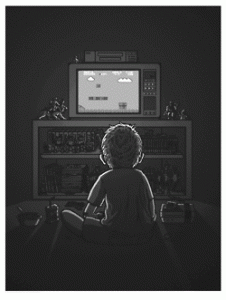 “Games lubricate the body and the mind” – Benjamin Franklin
“Games lubricate the body and the mind” – Benjamin Franklin
A couple of weeks ago I updated the Weather Channel app on my Android phone and was presented with the opportunity to sign up for a program called mPoints. Using this system I can earn “badges” and “points” that can be redeemed for gift cards or merchandise. This got me thinking about how much Gamification has become part of the everyday life.
What is “Gamification?” From Wikipedia: The term “gamification” first gained widespread usage in 2010, … referring to incorporation of social/reward aspects of games into software. For years educators have been trying to figure out how to use the inherent motivational aspects of game-play to drive students’ behavior.
In 2002 Marc Prensky wrote in “The Motivation of Gameplay” that the primary motivation for gameplay is “amusement.”
For while amusement may, in fact, be frivolous, enjoyment and pleasure are certainly not. We enjoy and take pleasure from many of the most serious things in life – our families, our passions, our work. The enjoyment, pleasure or “fun” we derive from these activities is the principal source of what makes us return to do them again and again — and there is increased “fun” because the more we do them the better we get, the easier they become, and the more goals we can achieve.
Among the collection of “fun activities” listed in an article by Pierre-Alexandre Garneau on the Gamasutra.com web site are Beauty, Immersion, Intellectual Problem Solving, Competition, Social Interaction, Love, Creation, Power, Discovery, Advancement and Completion, and Application of an Ability.
The blog “Think Feel Play” speaks about a model of Gaming Motivation in the context of 11 Basic needs:
Knowledge Reward: AchievementLearning is fun. We are not talking about school now. We are talking about the experience of finding out something interesting, exploring an interesting topic or environment. Any puzzle game thrives off the kick we get from learning to deal with the challenges the designers throw at us. At the same time, exploring a new game world is an enjoyable form of learning too. We want to know what is around the next corner.Skills Reward: AchievementGaining skills is fundamentally different from gaining knowledge. You might know how to do something but still not be able to do it. Think of all the sports games and beat-‘em-ups. You can know the combo or the optimal strategy, but you have to develop the reflexes, hand-eye coordination and razor sharp attention to pull it off. We all know what a headshot is, but it still feels so good to actually manage to nail one.Competence Reward: AchievementIt feels good to be good at something. Games offer the player an opportunity to be a hero or a god in the game world. Also, a well-designed game will show the player how much he has improved over the course of the game. Enemies from the earlier levels fall down at the sight of your mighty avatar. It is part of the reward of grinding levels and items. Once you have those items and levels, you are all-powerful in the game. There might be no challenge, but we love feeling competent. The difference with the “Skills” need above is that a sense of competence does not involve any learning, practice or challenge. It is simply about feeling good about how good you are.Perseverance Reward: AchievementPerseverance refers to not giving up even though things might be tough. Something you earn through sacrifice and willpower will always feel more valuable than something given for free. This is part of the appeal of Hardcore difficulty settings and insanely challenging games. It might be frustrating to grind through levels, but it feels so good to finally get there! You can be proud of yourself.Creation Reward: AchievementMany people refer to their creations as their “children”. We feel a sense of pride and ownership over our creations. In gaming this translates into anything from modding levels (strong creation) to customizing characters (weak creation).Danger Management Rewards: Achievement & FulfillmentRecognizing and dealing with danger is crucial to survival. We might not be threatened by wild animals on a daily basis anymore, but speeding cars can be just as deadly. Managing danger successfully can fill us with a sense of achievement. Yet, even when it does not, it is a basic instinct. You will always feel you have done the right thing, combined with some sense of relief. Video games simulate dangerous situations. That is why it feels satisfying to turn the tables on the enemy by circling around their ambush and sniping them off one-by-one.Competition Rewards: Achievement & RecognitionWinning has to feel good. If it did not, we would have been outcompeted from mates and resources. It is the core principle of “survival of the fittest”. Video games tap into this urge to win by offering two types of competition: Indirect and Direct competition. Indirectly, leader boards proclaim who is the best at a given game challenge. At the same time you can compare gaming achievements with your friends in real life to decide who the best gamer truly is. Directly, you can play matches against online opponents or battle it out with your friends in a split-screen game.Cooperation Rewards: Achievement, Recognition & FulfillmentCooperation is a complex and basic human need. Humanity has always banded together is tribes, villages, states, etc. The idea of “social capital” is that you have built up such a strong social network, that you can always fall back on friends and family when times get tough. Similarly, we can see romantic relationships as a cooperation as well. A very pleasant cooperation with strong feelings involved, but nevertheless a form of cooperation. Yet not only is cooperation a natural part of our lives, it can also be a source of achievement and recognition. Social status is completely defined by the recognition you get from your peers. Gaining more social status is an achievement in itself.Yet how does this relate to gaming? Cooperation plays a very prominent role in online gaming. Players bond and get a sense of belonging from joining guilds or finding good online gaming buddies. Also, gamers can bond in real life over the fact that they share a hobby, or they can help each other by teaching each other new techniques.Caring Rewards: Recognition & SatisfactionCaring is a basic need, as any parent can tell you. We feel the need to care for someone when we love them or when they trigger our caring response. This caring response comes into action when we look at little children, and feel that they are “cute”. Some video games tap into this by creating character art that makes us want to “care” for our avatar. In real life, you would often gain recognition for caring for someone. A child might hug you, a puppy might lick your face. Some video game characters mimic this by showing “gratitude” in the form of happy faces and frolicking behavior.Emotional Regulation Reward: SatisfactionEmotional Regulation is a large part of the appeal of gaming. The basic idea of emotional regulation is that we all try our best to feel okay. Sometimes feeling okay in the short term will obstruct feeling okay in the long term. On top of that, sometimes we are not sure what to do to feel okay because we have conflicting or unclear desires.Now, we might feel that emotional regulation is about feeling okay. However, it is reasonable to assume that “feeling okay” is just the reward we get for listening to our emotions. My assumption is that emotions are there to motivate you to do the right thing. For instance, fear makes you run away from threats, love encourages you to invest in a (hopefully) beneficial relationship, and anger fuels your desire to protect your rights. From this perspective, emotions are the instant priority list of survival. Of course they can be far from flawless, but they most often encourage us to move in the right direction before we even realize that there is any such thing as a right direction. I propose that gaming satisfies 3 forms of emotional regulation: Escapism, Catharsis, and Experience Simulator.Escapism is the act of distracting yourself from your daily problems through entertainment. Gaming can be a powerful experience, demanding all your mental attention. This in turn can make it a powerful tool to help you forget about your problems.Catharsis is Greek for “the emotional cleansing of the audience and/or characters in a play” (Wikipedia). Instead of acting out specific, unaccepted urges you might have, you try to act them out in an abstract way. For instance, you might want to smash something because you are angry or upset. Instead of smashing something in the real world, you turn on your console and wreck havoc in the game world.Experience Simulator is a term I coined myself to indicate a very unique quality of video games that sets it apart from all other media: Video games can simulate many experiences. Most of us do not get to drive racing cars or save villages from destruction. Video games are as close as we are going to get. In video games we get to pick an experience we want to step into. This way we can sate our appetite for excitement, exploration, or anything that we feel we lack in daily life.Optimal Choice Reward: SatisfactionThe least obvious human need discussed here might be that for “optimal choice”. It is a catch-all term for appreciation of beauty in all its forms, but without the cultural connotation of “art”. I pose that humans appreciate beauty because it originally indicated health and the “optimal choice” in our natural environments. People that look, smell and sound attractive were healthy mates and partners. Food that smelled and looked good was probably healthy. Environments that looked beautiful and attractive were probably rich in resources. This is how our senses led us to intuitively move toward “good things”. We did not need to “sleep on it”, because we instantly knew what was good or not. Our senses are a sort of quality control mechanism. Nowadays our senses cannot always tell us the truth anymore because we are all adept at fooling them with perfumes, cosmetics and artificial decorations
With the advent of social media and pervasive computing, we now have the infrastructure “keep score” for every day life. Lets look at a few examples of how gamification and the previously mentioned motivators are used now.
FourSquare is a great example of turning “life” into a “game.” FourSquare is a system that allows for an individual to sign up and then “check in” to physical locations that the commonly visit. All of the “check-ins” for that location are gathered and the individual with the most is the “Mayor.” Once a user has obtained the required “rank” the location can offer prizes, discounts, or other rewards. It is not uncommon to hear stories of individuals making special trips just to that they can maintain their “Mayor-ship” or a particular location. Types of motivation: competition, perseverance, social interaction and recognition, advancement, and reward. Sparked.com was founded in 2009, originally as a mobile microtasking company. They built powerful matching technology to connect volunteers to questions or help requests from nonprofits. In 2012, they expanded their application and refined it to help brands engage their customers through game-based, simple activities. This company then rewards the users with points and activity badges that they can share through social media outlets, as well as provide the user with a report that details their “scores.”For more information you can see a tour at: http://hello.sparked.com/mobile-tour/. Types of motivation: intellectual problem solving, competition, social interaction and recognition, and application of an ability. Klout.com distills the overall “influence” of an individual’s social media presence on the internet. Types of motivation: competition, social interaction and recognition, perception of power. StackOverflow.com is a programming question and answer website. Users there receive points and/or badges for performing a variety of actions, including spreading links to questions and answers via Facebook and Twitter. A large number of different badges are available, and when a user’s reputation points exceed various thresholds, he or she gains additional privileges, including at the higher end, the privilege of helping to moderate the site. Types of motiation: : intellectual problem solving, competition, social interaction and recognition, and application of an ability.
So how can you use Gamification to promote your brand? Are there particular activities that you would like to encourage your customers to do? Is there information that you would like to collect or observe? How can you make the process of “fun”? What basic need or desire can you either provide your customer or give the impression of providing? What do you think? Do you think that currently popularity of gamification is a short lived fad that will fade away once consumers tire of it or the market gets saturated? Or do you see it as a way to use the power of interactive digital media to convey your message in a very personal way?



